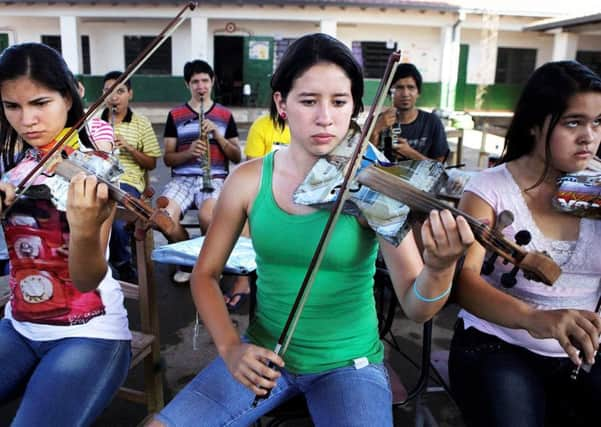New film to show inspiring Recycled Orchestra


The town of Cateura, six miles south of Paraguay’s capital city Asuncion, would seem to most of us like a living hell. It is built around the country’s main landfill site, a sprawling mountain of garbage on the floodplain of the Paraguay River that provides the main source of employment for the village’s 10,000 inhabitants.
It is, to all intents and purposes, a community of professional scavengers, whose menfolk - gancheros – pick and sort through the giant rubbish tip daily for a meagre living. The streets are rugged, trash-strewn and mudded; family homes are rickety shacks, with hanging drapes as outside walls and salvaged cans for pots and pans.
Advertisement
Hide Ad“Here in Paraguay, the social conditions often limit the ability to dream,” says environmental engineer Favio Chávez, who is behind an extraordinary musical project that has transformed the lives of many of Cateura’s children.
He first came to Cateura in 2006 to work on a recycling programme. It had so little impact that it was shut down, so he turned to his other love, music, opened a music school, and created an orchestra whose instruments were made out of recycled trash. Nine years on, the Recycled Orchestra of Cateura is a worldwide sensation, touring extensively, and the school is now a fast-growing, long-term concern.
The story went viral a couple of years ago through a YouTube clip that featured smiling kids with their battered-tin violins, bottle-top saxophones, metal-pipe flutes and oil-can cellos playing Mozart and Beethoven. Now a documentary film has been made that charts the remarkable inception, tenacious development, and at one point near-collapse, of the initiative. Scottish audiences can see Landfill Harmonic this week, in Glasgow and Edinburgh, as part of the social change film festival, Take One Action!
Of course, we only see the edited highlights of a decade-long process that must have required extreme persuasiveness on Chávez’s part to gain parental support, pupil commitment and a place to rehearse.
But before long, he has one-time construction worker and former garbage picker “Cola” building instruments out of trash: a cello with a wooden spoon as a tail piece; a snapped stiletto heel functioning as a violin tuning peg; a discarded X-ray film as the perfect drum skin. Even Chávez’s guitar, with which he leads his scrapyard band, is made out of a couple of giant tin cans. Yet somehow, this Heath Robinson ensemble make music, with a sound which comes directly from the heart.
The film captures the highs as well as the lows. When one of the girls, Ada, sent a picture of the orchestra to rock group Megadeth, lead singer David Ellefson came straight to Cateura. Bowled over by their passion, he invited them to play a gig with Megadeth in Denver.
Advertisement
Hide AdThen there’s the devastating flood in 2013 that left much of the town engulfed in water, and many of the families homeless, for three months.
Landfill Harmonic is a remarkable testimony to a project that has given hope to those for whom abject hopelessness was the norm. Take Tania. At the start of filming in 2009, she is an emotionally closed book – her father has deserted their ramshackle home, which she and her mother struggle to maintain. She is severely withdrawn, uncommunicative and wary of others. Five years later, she is a radiant teenager with lots to say and a future in sight.
Advertisement
Hide Ad“Several have received scholarships to the conservatoire in Asuncion,” says the film’s joint director, Brad Allgood, who was brought into the filming process late on, but recognised immediately the initiative’s true value. “There’s something about these kids’ spirit and their dedication and resilience that is palpable when you meet them. The orchestra provides them with a support network, a community, a forum for self-expression and other life lessons that wouldn’t otherwise be present in their lives.”
As someone who served in the Peace Corps in Nicaragua, Allgood has seen poverty at its lowest ebb. “It’s a mentality, not just a set of circumstances. What really struck me in Cateura was that, yes, there are pretty unfavourable conditions, but the resilience of the kids, Favio and the families have enabled them to do so much in the face of such great odds.”
Inevitably, publicity surrounding the filming has helped bring Cateura’s musical phenomenon to the notice of politicians. “We did film a scene where Favio was honoured with an award by the country’s National Assembly, and the orchestra has since been named as touring ambassadors for Paraguay,” Allgood explains.
More importantly, Congress also provided the Recycled Orchestra with a grant to purchase and renovate its own music school, which is now operating with around 300 pupils and employs dedicated teachers.
Does that mean they can now purchase real instruments? “That presents an interesting dilemma,” Allgood explains. “The project has evolved to a point where the instruments they use are a part of their brand. Favio is very smart and very protective of that brand, so when performing, they only use recycled instruments.
“But they have received lots of instrument donations over the years and a lot of the advanced students now take proper ones home to practise on, as many of them want to become professional musicians.
Advertisement
Hide Ad“What’s ironic, is that the recycled instruments are far more difficult to play. Each one is unique, with difficult tunings, so requires a lot more skill. Once they pick up a real instrument, its like butter – so much smoother to play.”
• Landfill Harmonic is at the Glasgow Film Theatre on 23 September and The Filmhouse, Edinburgh on 26 September. For more information, visit www.takeoneaction.org.uk